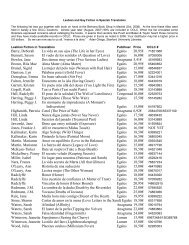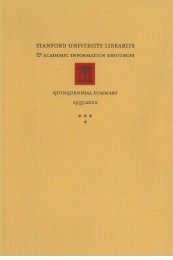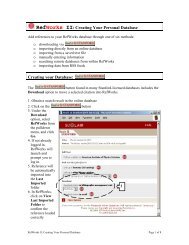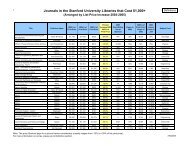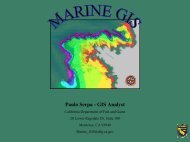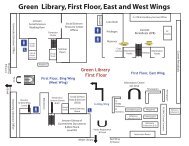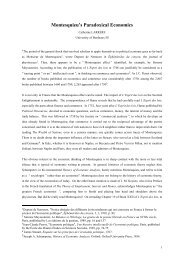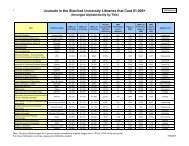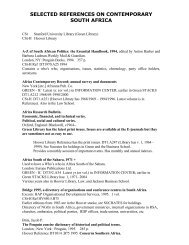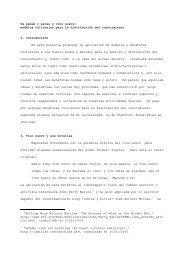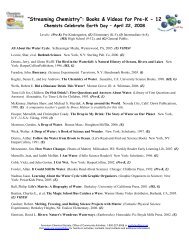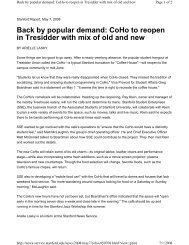The Abbé de Saint-Pierre and the Emergence of the 'Quantifying ...
The Abbé de Saint-Pierre and the Emergence of the 'Quantifying ...
The Abbé de Saint-Pierre and the Emergence of the 'Quantifying ...
You also want an ePaper? Increase the reach of your titles
YUMPU automatically turns print PDFs into web optimized ePapers that Google loves.
Abbé <strong>Saint</strong>-<strong>Pierre</strong> <strong>and</strong> <strong>the</strong> “Quantifying Spirit” 14<br />
application <strong>of</strong> <strong>the</strong> reasoned methods <strong>of</strong> <strong>the</strong> natural sciences to <strong>the</strong> practices <strong>of</strong> statecraft. As he<br />
<strong>de</strong>scribed <strong>the</strong> change <strong>of</strong> direction at <strong>the</strong> time:<br />
After spending three or four years studying physics, I read <strong>the</strong> Pensées <strong>of</strong> M. Pascal.<br />
Afterwards I un<strong>de</strong>rstood that <strong>the</strong> progress I could make in studying morality would be<br />
more useful in increasing my well-being <strong>and</strong> that <strong>of</strong> <strong>the</strong> o<strong>the</strong>rs with which I lived. Thus I<br />
gave up <strong>the</strong> study <strong>of</strong> physics <strong>and</strong> began to study <strong>and</strong> meditate upon morality. … After<br />
various readings, however, … I perceived that <strong>the</strong> well-being increases or <strong>de</strong>creases most<br />
dramatically with respect to laws. … It was this realization that led me to apply myself to<br />
<strong>the</strong> study <strong>of</strong> government. … <strong>The</strong> reflection returned again <strong>and</strong> again to my mind, <strong>and</strong> it<br />
persua<strong>de</strong>d me that moral science is not <strong>the</strong> most important for <strong>the</strong> well-being <strong>of</strong> men.<br />
Instead, it is politics or <strong>the</strong> science <strong>of</strong> government since a wise law can ren<strong>de</strong>r<br />
incomparably more people happy than a hundred good moral treatises. <strong>The</strong>refore, with<br />
<strong>the</strong> goal <strong>of</strong> becoming more useful to society, I ab<strong>and</strong>oned <strong>the</strong> study <strong>of</strong> morality for <strong>the</strong><br />
study <strong>of</strong> politics. 34<br />
<strong>The</strong> move from <strong>the</strong> scientific training <strong>of</strong> his twenties to <strong>the</strong> new political science <strong>of</strong> his thirties<br />
was a natural one for <strong>Saint</strong>-<strong>Pierre</strong>, <strong>and</strong> <strong>the</strong> science which he created bore <strong>the</strong> <strong>de</strong>ep traces <strong>of</strong> his<br />
earlier experiences, especially his connections to advanced ma<strong>the</strong>matics.<br />
Quantification in <strong>Saint</strong>-<strong>Pierre</strong>’s Science Politique<br />
Three <strong>the</strong>mes dominate <strong>Saint</strong>-<strong>Pierre</strong>’s political science-- information, circulation, <strong>and</strong><br />
quantitative calculation. Each was a product <strong>of</strong> <strong>the</strong> abbé’s formative experiences in Paris in <strong>the</strong><br />
final <strong>de</strong>ca<strong>de</strong>s <strong>of</strong> <strong>the</strong> seventeenth century, especially his dual encounter with <strong>the</strong> new natural<br />
sciences <strong>of</strong> <strong>the</strong> period <strong>and</strong> <strong>the</strong> new practices <strong>of</strong> administrative monarchy. <strong>The</strong> imperative toward<br />
information in <strong>Saint</strong>-<strong>Pierre</strong>’s thinking <strong>de</strong>rived from his appreciation <strong>of</strong> <strong>the</strong> role <strong>of</strong> direct<br />
observation <strong>and</strong> empirical facts in <strong>the</strong> new physical science <strong>of</strong> <strong>the</strong> seventeenth century. <strong>The</strong><br />
emphasis upon circulation, especially <strong>the</strong> public dissemination <strong>and</strong> discussion <strong>of</strong> political<br />
knowledge, likewise <strong>de</strong>rived from <strong>Saint</strong>-<strong>Pierre</strong>’s experiences within <strong>the</strong> new culture <strong>of</strong> public<br />
scientific practice characteristic <strong>of</strong> <strong>the</strong> same period. Finally, <strong>the</strong> bias toward quantification <strong>and</strong><br />
<strong>the</strong> belief that a true political science would result in a rational calculus <strong>of</strong> political <strong>de</strong>cision-



